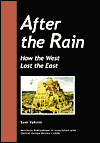


|
|
ISSUE NO 1.43 |
THE REVIEWS THIS WEEK |
MAY 28, 2000 |
|
I do not hesitate to read ... all good books in translations. What is really best in any book is translatable -- any real insight or broad human sentiment. Ralph Waldo Emerson. | |||||||||||
 |
ANIL'S GHOST This novel is in a way the reconstruction of the face of war, but with a lot of sidesteps. It is not so much about politics but more about individuals who all have a role in the war. In one of the last chapters Gamini confesses that he could never leave the island. The love for the place. "American movies, English books - remember how they all end? The American or the Englishman gets on a plane and leaves. That's it. The camera leaves with him.[…] He's going home. So, the war to all purposes, is over. That's enough reality for the West. […]" Anil will disappear from the final pages of this novel. Taking her ghost with her, says Michiel Baas | ||||||||||
 |
AFTER THE RAIN
HOW THE WEST LOST THE EAST When a man writes with his pen dipped in vitriol, a compilation of his articles are foreordained to make the reader react. Or they might even leave her/him numb, for Israel-born Sam Vaknin is hard-hitting. He does not mince his words, calls a spade a spade and has a sardonic-laconic way of putting things across. The subtitle of After the Rain says it all: the West has, for all practical purposes, lost the East, writes Subir Ghosh | ||||||||||
 |
AMERICA DIVIDED
THE CIVIL WAR OF THE 1960S Memories of the Sixties are still afresh in the minds of many in contemporary American society. People remember what they want to remember. Democrats believe the Sixties were a golden age of government activism on behalf of the dispossessed, destroyed by the conservative white backlash of the seventies, eighties, and nineties. For Republicans, the Sixties signalled the beginning of a long moral slide in the United States and an end to governmental restraint and fiscal responsibility, points out Gene Evans | ||||||||||
 |
BONES OF THE MASTER
A BUDDHIST MONK'S SEARCH FOR THE LOST HEART OF CHINA Gory accounts of atrocities are missing, and so are those of any mysticism. Crane's narrative transcends Tsung's spiritual outlook and his own worldly outlook. In other words, this one is not like the archetypal books about China. The trappings may look familiar: a young disciple flees an exotic land with his master's spiritual secrets to escape from marauding persecutors, a devout monk, a die-hard sceptic and their thrilling adventures... Yet, this is no Hollywood blockbuster script. This is a true story. With truth being stranger than fiction, there is no reason why one should not see a cinematic version of Crane's narrative either. But if only poetry can be rewritten on celluloid, wonders Gene Evans | ||||||||||
 |
GLOBAL CIVIL SOCIETY
DIMENSIONS OF THE NONPROFIT SECTOR Global Civil Society, the result of years of study by 150 researchers through the Johns Hopkins Comparative Nonprofit Sector Project, is a comprehensive country-by-country analysis of the scope, size, composition, and economic dimensions of the nonprofit sector in 22 countries spread over six regions. The systematically comparative and methodologically rigorous overview report should interest nonprofit and foundation leaders, public policymakers, educators, and others interested in nonprofit activity around the world, says James Warder. | ||||||||||
| Archives Previous page Top | |||||||||||